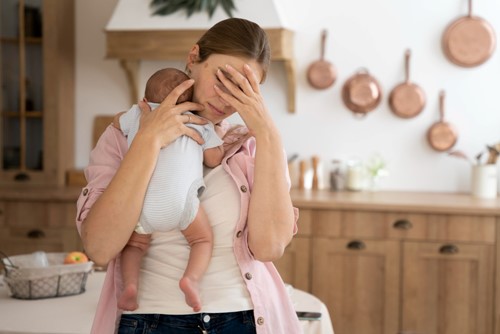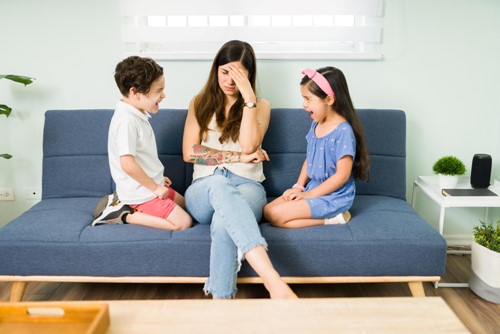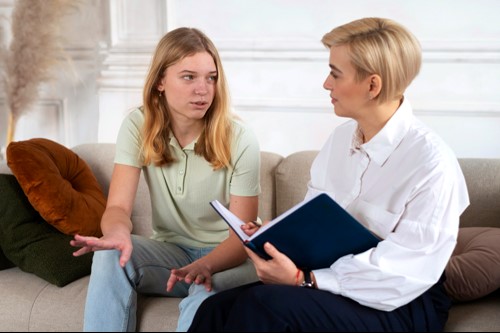Improving Mental Health After Having a Baby
At one time, women who showed signs of struggling with their mental health were at a high risk of hospitalisation for ‘hysteria’.

This was the harsh reality for women with symptoms of depression, bipolar disorder, borderline personality disorder, post-traumatic stress disorder, panic attacks, and other forms of psychiatric illness that were not understood until relatively recently.
One group that was affected by this disproportionately was new mothers. There was simply no concept of antenatal, postnatal or perinatal depression, anxiety or psychosis. Women displaying symptoms of these illnesses were often viewed as unhinged, immoral, and even sinful.
Mental health literacy has come a long way since then. We now understand the dramatic effect childbirth can have on women’s mental health, and we acknowledge that this isn’t a reflection on the mother’s morality or quality of parenting.
This is reflected in the training of health professionals. Health visitors are trained to spot signs of mental health difficulties in their clients, which has saved many lives across the UK.
Yet, a huge number of women are still suffering in silence after having a baby. What does this tell us?
We need more education, empathy and eagerness when it comes to discussing the battles many women face after giving birth.
Will Having a Baby Affect My Mental Health?
It can be tricky to discuss postpartum mental illness without either scaring pregnant women or lulling them into a false sense of security. The truth is no one can tell you how you will cope after having a baby.
The only guarantee is that it will pose new challenges, and you will need to adopt strategies to stay as stable as possible. This is absolutely achievable.
There are certain factors that can make it harder on women’s mental health when they give birth. Some examples are:
* Having a pre-existing mental health condition
* Struggling with physical health during pregnancy
* Not having a support system
* Being prone to postpartum issues (identified through family history or previous pregnancy experiences)
* Staying inside the house and/or not having visitors
* Being a victim of domestic violence or being in an unhealthy relationship
* Not being educated on the difficulties of giving birth and having a baby
Fortunately, many of these situations can be improved before you have your baby. When you are familiar with the common triggers for poor mental health, you can fight against them by adopting healthy coping mechanisms.
Other factors are harder to resolve, such as having an abusive partner. This is where it’s important to speak to a mental health professional. As much as small tips can steer you in the right direction, they won’t be enough to get you out of such a dangerous situation.
It's also important to acknowledge that fathers can also face mental health problems in the weeks, months and even years after the birth. Symptoms of paternal postpartum depression should not be overlooked.

What are Common Mental Health Struggles After Having a Baby?
Many women struggle with their mental health post-birth without developing a mental health disorder. It’s possible that you will struggle for a short period and recover wonderfully. However, it’s better to be cautious than complacent.
Speak to your GP to distinguish between mild difficulty adjusting to the baby and a diagnosable mental health disorder.
There are three psychiatric disorders that commonly affect women after birth: postpartum blues, postpartum depression and postpartum psychosis.
Postpartum blues are also known as the baby blues. This is very common, affecting at least 50% of women within the first few weeks after birth.
Regardless, the baby blues should not be downplayed. It can be extremely challenging, especially if it comes unexpectedly. Symptoms include sadness, irritability, reduced appetite, and anxiety.
Most women experience the baby blues for up to two weeks and then return back to their baseline. However, more than one in ten women develop postpartum depression within a year of giving birth.
Untreated postpartum depression can also be present from the very beginning, but misdiagnosed as the baby blues.
Symptoms of depression in the postnatal period include isolation, hopelessness, persistent sadness, intrusive thoughts and insomnia.
It is crucial that anyone with these signs visits their GP, as undiagnosed postnatal depression can be fatal for both the mother and baby.
Postpartum psychosis is the final widespread mental health disorder affecting new mothers. This disorder is much rarer, so the average new mother has a low risk of postpartum psychosis.
It affects just 1-2 per 1000 postpartum women. Symptoms include suicidal ideation, extreme mood swings, hallucinations and delusions.
Unfortunately, this condition tends to have the most stigma attached to it. It’s important to note that mothers who experience dangerous symptoms of postpartum psychosis are not simply unfit mothers.
Just like postpartum blues and depression, post-birth psychosis can be treated effectively by mental health professionals.
Finally, many new mothers experience postpartum anxiety. Though this is not classed as one of the three main disorders, it is a widespread issue.
Due to overlapping symptoms with the other conditions, it is often undiagnosed. Women with this condition may experience intrusive thoughts, racing thoughts, excessive sweating, and a constant feeling of dread.
Just because we haven’t mentioned a condition on this list doesn’t mean it isn’t a common issue for new mothers. Mental illness is incredibly complex, and when hormone changes are added to this, the outcomes can vary hugely.
This is why new mothers should reach out for help when they are struggling, and we should offer help to women in the postpartum period even if they appear to be coping well.
Improving Mental Health After Having a Baby: Top Tips
It can be demoralising to hear of all the potential struggles you may face after giving birth. However, knowledge is power. The more you know about postpartum mental illness, the more equipped you are to cope with the big changes to come.
Anyone who is struggling with severe mental health issues, such as suicidal ideation or violent thoughts, should seek professional help as this is a medical emergency.
Go to A&E or call 999 immediately if you see dangerous mental health symptoms in yourself or a loved one. If you find yourself drinking too much, call on a helpline such as Rehab Recovery, a helpline that can also help with things like alcohol rehab.
There is help available no matter how extreme your situation is. The benefits of medication and therapy must not be dismissed simply because some mothers manage without it. There is no shame on using these tools to overcome mental health challenges.

1. Be Honest With Health Care Professionals
Even in this day and age, many women are worried that admitting their weaknesses could lead to their baby being taken away.
Please be assured that you can freely express experiences of postnatal depression, anxiety and psychosis to your doctor without being punished.
Even if you have thoughts of harming your baby, this does not mean that you are going to do it. By expressing this early on, you can get the help you need to stop having those thoughts.
It’s also common to worry about criticism from your health visitor. We’ve all heard of women scrubbing the house top to bottom ready for the big arrival, in order to seem like a fantastic mother.
Health visitors know that having a perfectly clean house is not what makes you a great mother. They are not there to pick apart your weaknesses.
Try to see them as people who want to support you and your baby, and you will find it easier to open up to them about the parts of motherhood you need help with.
2. Don’t Try to Do It on Your Own
Some women can’t avoid being on their own with their baby the majority of the time. Perhaps they are a single parent or their partner works long hours.
This means they have no choice but to carry the load of the daily tasks involved with having a baby.
Regardless, there is always an opportunity to connect with others at this trying time. Local postpartum and baby groups can be lifesavers for women battling poor mental health after giving birth.
If this is too much for you at the moment, you could even try contributing to forums, as this is still a great way to integrate into a network of women facing similar ups and downs.
Future fathers should also look into likeminded communities, particularly as there are unique barriers to fathers due to the increased stigma surrounding male mental health.
If you are fortunate enough to have people offering help, such as cooking meals, running errands and taking the baby while you nap, don’t say no simply out of politeness.
If you don’t feel comfortable for other reasons, that’s perfectly understandable, but refusing help that would be valuable to you can lead to worsened mental health issues.
3. Take Each Day as it Comes
Having a baby is one of the biggest life events for many women. It’s natural to look ahead and speculate about the struggles you will face as well as the stages you will love.
There’s nothing wrong with some reflection, but try not to let it turn into a hyper fixation on things you cannot control.
If you find yourself dwelling on future difficulties, even if it’s just how you’re going to cope tomorrow, ground yourself by focusing on the present moment and finding unique ways to enjoy each day. In other words, practise mindfulness.
For example, if you find yourself thinking ‘I am too sleep-deprived. I won’t be a good mum this week’, take a deep breath and look at your surroundings – your baby, your home, your creature comforts.
Remind yourself that you can get through motherhood by taking it one day at a time. The washing won't always be done, and the floors won't always be sparkling, but these tasks do not need to be daily chores.
Mindfulness will prevent you from feeling overwhelmed and shutting down. It will also help you to appreciate each stage that your baby goes through, even if there are elements of each stage that you are keen to leave behind.
4. Enjoy the Small Pleasures
We hear this tip everywhere when it comes to advice for new or expectant mothers. It’s become somewhat of a cliché, but after all, clichés exist for good reason.
When you’re trying to look after your baby after a sleepless night, it’s incredibly difficult to feel grateful for the small pleasures.
Most new mothers spend a significant amount of time thinking about how they wish they could be sleeping, which takes away from the small pleasures that they are experiencing.
This isn’t to say that you can’t complain about the difficulties of motherhood. Complain away! But reel it back in every so often to remind yourself of the privileges you still have.
This could be as simple as enjoying a cup of tea when the baby’s having a nap, putting your favourite music on while you do the housework, and appreciating nature on a nice walk.
5. Set Boundaries
It’s true that isolation is strongly linked to postpartum mental illness. This is why it’s advised to have guests over, meet with friends, and stay in touch with people over the phone and social media.
However, balance is key when you’ve just had a baby, so make sure you’re setting boundaries that you’re comfortable with. This may mean delaying guests for a period, saying no to certain guests, or not allowing babysitting until the baby reaches a certain age.
When you have firm boundaries, you benefit from boosted self-esteem and social confidence. This can do wonders for your mental health.
You may also find that your relationships are stronger as you’re valuing authenticity, which many people will respect you for.